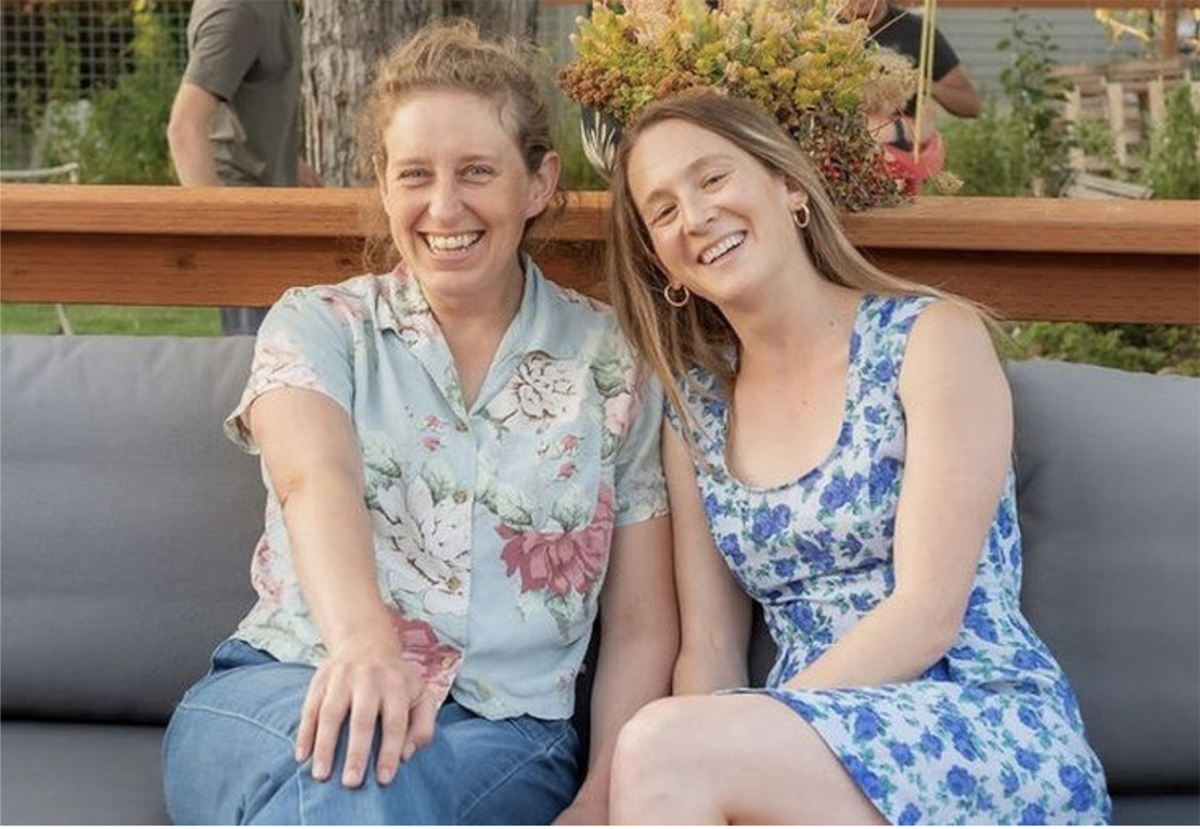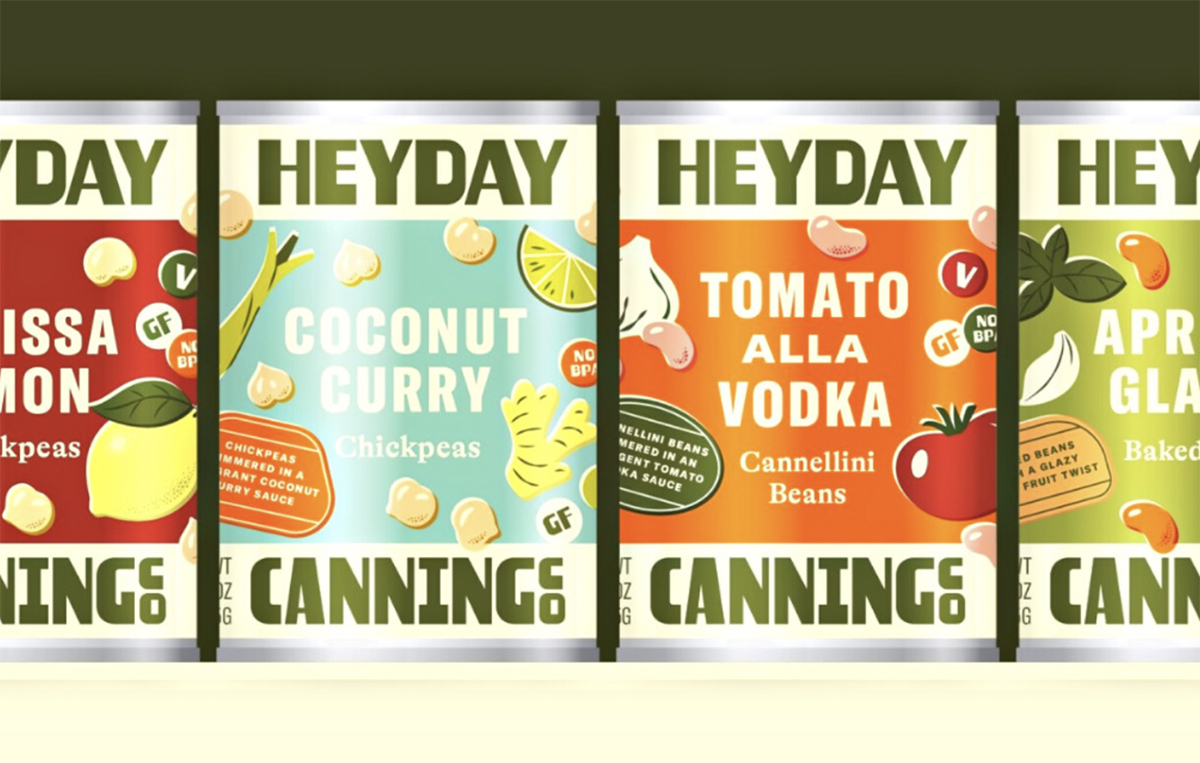September 5, 2023
On a mission to give canned beans the delicious recipes they deserve, Kat Kavner chats to the GPC about tearing down canned food stigma and how Heyday is cooking beans to provide flavor, not just filler.


Jaime Tulley and Kat Kavner — Image Credit: Heyday Canning Co
Myself and my co-founder Jaime both come from a background in the natural foods CPG (Consumer Packaged Goods) world and have been in the industry for a little over a decade. We met working at Sweet Earth Natural Foods, which primarily worked in the frozen food space, mostly producing vegan items like frozen entrées and burritos – things like that.
My background is on the marketing side, so I worked primarily on product development and developing strategy behind the brand. Jamie comes from a very different side of the industry – she's classically trained as a food scientist and has spent most of her career in hands-on food manufacturing.

Image Credit: Heyday Canning Co
In the spring of 2020 we started talking about canned food when the pandemic hit and suddenly everybody was buying canned food – sales were off the charts for the first time in a long time and it was a lightbulb moment for me of thinking: "there's an entire aisle of the grocery store where just no innovation is happening!" – it was all big legacy brands and cheap commodity items. That had created a race to the bottom mentality: everything was all about price and nothing else.
In pretty much every other category within CPG there has been tremendous amounts of innovation from start-ups in better touch with the things consumers want like flavor, quality, sustainability, brand perspective – you name it. Canned food has remained this untouched but very, very large category still dominated by these big players.
We then started to get very excited about beans for the very non-strategic reason that we both just love beans!
Jamie and I are both big bean people ourselves, and when you're cooking with them you're flavoring them in some way – seasoning them with spices and cooking them in olive oil. You’re always doing something to doctor them up and make them really delicious, but when you see them on the canned food are either plain beans in water or just baked beans.
It was just baffling to me that nobody had brought big, bold flavor to beans when it seems so obvious. The more we dug into it, the more we thought that there was really no other brand doing what we had in mind, and it seemed like something that would really resonate with people.
There are a variety of reasons to believe that there are tailwinds behind beans as a category – more folks are looking to plant-based, and we've seen meat alternatives soften in recent years. There's been so much excitement behind those brands and then they've started to taper a little bit, I think because people are looking for more wholesome, nutritious ways to get plant-based protein, and – gosh, beans just have such an amazing nutritional profile!
“…people are looking for more wholesome, nutritious ways to get plant-based protein, and – gosh, beans just have such an amazing nutritional profile!”
The stigma around canned food is that it's low quality and sometimes doesn't have great nutritional value. I think it depends on the segment – my guess is that perception around nutrition is worse for something like canned vegetables than it is for canned beans.
Generally speaking, I think the weaknesses in canned bean perception are around the quality of the food inside – that overall it's an inferior quality product and that fresh or even frozen will deliver better flavor, quality, and even nutritional experience.
Canned food is a last resort right now – something people load up on when the world is ending during the pandemic, not something you turn to because you're excited about loading up your pantry. Our hope is very much to change consumer perception around canned food and get consumers to think about them as an easy shortcut to amazing flavor.
There’s not a simple answer, and I'd say it depends on the specific food. For example I think tomatoes and carrots actually have a stronger nutritional profile coming out of the can.
I think there are some vegetables that, in theory, have stronger nutrition if they’re fresh, but it also depends on how long it's been since they went from field to plate. It's not always as straightforward as saying that fresh is always better, and canned is always worse.
I think it's important that people know that canned food is food that has been cooked at a high heat – that's all it is. A lot of people think there are artificial preservatives added during canning or that there is lots of salt, but neither of those things are true. Food goes into the can and you put it into the canner at a very high heat that creates a sterile environment where bacteria can't grow.
Hopefully we will be a key player in driving the transformation of how consumers think about canned food, which can affect the way it is manufactured. Right now, if you look at the canneries out there in the manufacturing landscaping canning more broadly, they reflect what you see on the shelf – commodity items are very simple and very inexpensive. So the only way to make money as a manufacturer is running at a huge scale.
These are very large and efficient operations geared towards making commodity products as inexpensively as possible. They’re very good at that, but they aren't currently geared towards culinary innovation and crafting recipes with flavor at heart.
It has been a challenge for us to find the right manufacturer, but I hope that as we prove demand is really there for these kinds of products, more manufacturers will see that the juice is worth the squeeze – that will help them think differently about their lines.
That factored in very heavily when we came up with the idea – one of the first questions we had was about the packaging we wanted to put the beans in. More and more plastic pouches have started to creep into the market, and I think only 2% of those pouches are curbside recyclable, so for us it was a no-brainer. We thought: “Why go to plastic when we have this really great, sustainable form of packaging that has been around forever?”
As we started digging into it, the statistics blew us away – cans are actually the most frequently recycled form of any type of food packaging. There is a strong sustainability story there that we felt wasn't really being told, and that we could tell it.
In the immediate future we will just stick with beans, but it is our intention to build a brand move beyond just beans. As we look through the whole aisle we feel every canned food category is ready for reinvention, whether that’s soups, chilis, or even canned vegetables and fruits.
Some people think they're never going to eat canned vegetables again, especially if they grow up eating a lot of canned green beans or peas. I think we can fundamentally reimagine what those categories look like, but it’ll take time to get there.

Future of Food / Heyday Canning Co / Kat Kavner / beans / navy beans / chickpeas / canned beans / canned pulses
Disclaimer: The opinions or views expressed in this publication are those of the authors or quoted persons. They do not purport to reflect the opinions or views of the Global Pulse Confederation or its members.